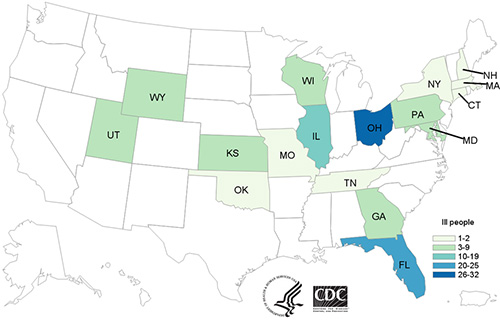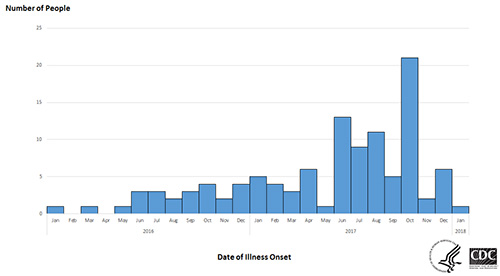Multistate Outbreak of Multidrug-Resistant Campylobacter Infections Linked to Contact with Pet Store Puppies
Final Update
Posted January 30, 2018 3:45 PM ET
This outbreak investigation is over. Illnesses could continue because people may be unaware of the risk of Campylobacter infections from puppies and dogs. Information about how to prevent illness when handling puppies and dogs is available for pet owners.
17
States
23
Hospitalizations
0
Deaths
113
Cases
CDC, several states, and the U.S. Department of Agriculture’s Animal and Plant Health Inspection Service (USDA-APHIS) investigated a multistate outbreak of multidrug-resistant Campylobacter infections. Epidemiologic and laboratory evidence indicated that contact with puppies sold through Petland stores were a likely source of this outbreak. This outbreak investigation is over. Illnesses could continue to occur because people may be unaware of the risk of Campylobacter infections from puppies and dogs.
A total of 113 people with laboratory-confirmed infections or symptoms consistent with Campylobacter infection were linked to this outbreak. Illnesses were reported from 17 states. Illnesses started on dates ranging from January 12, 2016 to January 7, 2018. Ill people ranged in age from less than 1 year to 86, with a median age of 27. Sixty-three percent of ill people were female. Of 103 people with available information, 23 (22%) were hospitalized. No deaths were reported. Whole genome sequencing (WGS) showed that isolates from people infected with Campylobacter were closely related genetically. This close genetic relationship means that people in this outbreak were more likely to share a common source of infection.
Campylobacter bacteria isolated from clinical samples from people sickened in this outbreak were resistant to commonly recommended, first-line antibiotics. This means it may be difficult to treat these infections with the antibiotics usually prescribed for Campylobacter infections. Antibiotic resistance may be associated with increased risk of hospitalization, development of a bloodstream infection, or treatment failure in patients. Using WGS, we identified multiple antimicrobial resistance genes and mutations in most isolates from 38 ill people and 10 puppies in this outbreak. This finding matched results from standard antibiotic susceptibility testing methods used by CDC’s National Antimicrobial Resistance Monitoring System laboratory on isolates from five ill people and seven puppies in this outbreak. The 12 isolates tested by standard methods were resistant to azithromycin, ciprofloxacin, clindamycin, erythromycin, nalidixic acid, telithromycin, and tetracycline. In addition, 10 were resistant to gentamicin, and 2 were resistant to florfenicol.
In interviews, ill people answered questions about the foods they ate and any animal contact in the week before they became ill. Ninety-nine percent of people reported contact with a puppy in the week before illness started, and 87% reported they had contact with a puppy from Petland stores, or had contact with a person who became sick after contact with a puppy from a Petland store. Twenty-five ill people worked at Petland stores.
During the investigation, officials collected samples from pet store puppies for laboratory testing and identified the outbreak strain of Campylobacter in the samples. WGS showed that the Campylobacter isolates from sick people in this outbreak and isolates from pet store puppies were closely related genetically, providing additional evidence that people got sick from contact with pet store puppies.
Ill people reported contact with different breeds of puppies at different store locations in several states. The investigation did not identify a common breeder where puppies infected with the outbreak strain of Campylobacter originated. Puppies in this outbreak may have become infected at various points along the distribution chain when they had contact with infected puppies from other breeders or distributors during transport to pet store locations. Enhanced infection prevention measures throughout the distribution chain may help reduce the spread of Campylobacter infections among puppies.
This multidrug-resistant outbreak highlights the need for responsible use of antibiotics in pets. Education about best practices for Campylobacter disease prevention, diarrhea management in puppies, and responsible antibiotic use is essential throughout the distribution chain to help prevent the emergence and spread of antibiotic resistance. Pet owners should be aware that any puppy or dog, regardless of where it is purchased or adopted, may carry germs like Campylobacter that can make people sick. Always wash your hands thoroughly with soap and water right after touching puppies and dogs or after picking up their poop. Work with your veterinarian to keep your animal healthy to prevent disease. More information about how to prevent illness when handling puppies and dogs is available for pet owners.


